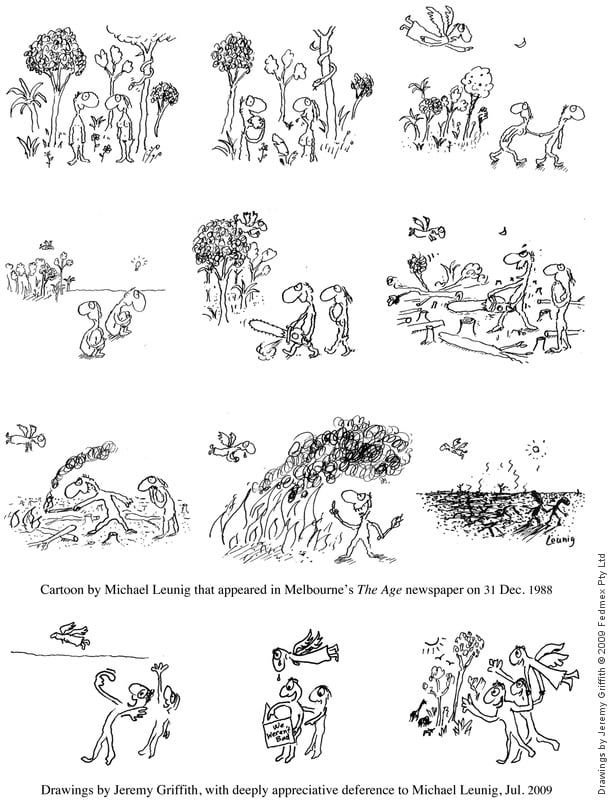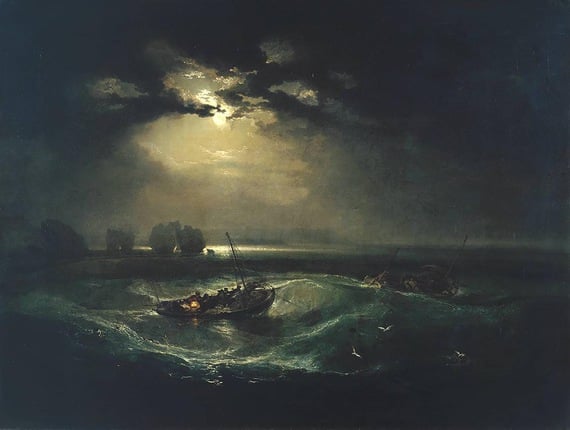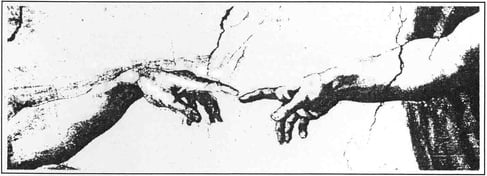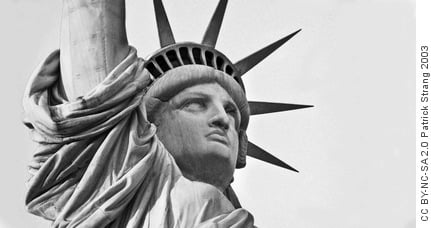‘FREEDOM’—Chapter 3 The Real Explanation of The Human Condition
Chapter 3:6 Adam and Eve — we humans — are heroes NOT villains
We can now see that Moses’ Biblical story of Adam and Eve in the Garden of Eden accurately describes the primary situation involved in our human condition of the psychologically upsetting battle that emerged between our instincts and our conscious intellect’s search for knowledge. It says Adam and Eve/we took the ‘fruit’ (Genesis 3:3) ‘from the tree of…knowledge’ (Gen. 2:9, 17) and were ‘disobedient’ (the term widely used in descriptions of Gen. 3). In other words, we developed a conscious mind and free will. But in that pre-scientific story it says Adam and Eve then became perpetrators of ‘sin’ (Gen. 4:7) and as a result were ‘banished…from the Garden of Eden’ (Gen. 3:23) of our species’ particular cooperative and loving, innocent, Edenic instinctive state for having become ‘evil’ (Gen. 3:22), whereas this scientific presentation reveals Adam and Eve to be the HEROES, NOT THE VILLAINS they have so long been portrayed as. So while humans ARE immensely upset—that is, immensely angry, egocentric and alienated—WE ARE GOOD AND NOT BAD AFTER ALL!!!! Yes, this explanation finally allows us to see that our conscious mind that caused us to take the ‘fruit’ ‘from the tree of…knowledge’ is NOT the sinful, evil villain it has so long been portrayed as. And ‘upset’ is the right word for our condition because while we are not ‘evil’ or ‘bad’ we are definitely psychologically upset from having to participate in humanity’s heroic search for knowledge. ‘Corrupted’ and ‘fallen’ have sometimes been used to describe our condition, but they have negative connotations that we can now appreciate are undeserved.
The following is another famous cartoon by Michael Leunig that beautifully illustrates the journey humans have been on in our quest for understanding—what is missing, however, from his depiction is this final, truthful revelation of our species’ heroism that the explanation of the human condition has now made possible. So it is with deep reverence to Leunig that I have taken the liberty of drawing three more frames in his marvellously expressive style to complete the story. Leunig’s cartoon depicts the Genesis story of Adam and Eve in the Garden of Eden, beginning with the wide-eyed and innocent Adam and Eve taking the ‘fruit’ ‘from the tree of…knowledge’ and being ‘banished…from the Garden of Eden’ as a result. Up to that point there is nothing unusual about the story being portrayed, however, the cartoon goes on to show Adam reaping revenge upon that hallowed Garden. It is possible that Leunig meant for the retaliation to be interpreted as a straightforward joke about human behaviour—‘You kicked me out, I’ll get even’—but surely there is a deeper truth to the retaliation that accounts for the cartoon resonating with so many people. Hasn’t Leunig got to the truth that lies at the very heart of the issue of our human condition, and summarised that truth in the most succinct way possible using the story of the Garden of Eden? Hasn’t he captured the underlying feeling that we humans have of being condemned as fundamentally evil and God-disobeying when in our heart of hearts we don’t believe we are; and hasn’t he captured the psychotic and neurotic anger that feeling of unjust condemnation has caused us? This is a deservedly celebrated cartoon, for, as emphasised, we humans have been unjustly condemned for some 2 million years—so how deeply, deeply angry must we be inside ourselves having had to live undefended on this planet for so long! Wouldn’t, and shouldn’t, we be as angry as Leunig has depicted us in this cartoon!
To analyse the cartoon’s elements more closely, in the fourth frame Adam is shown fuming with rage and resentment for being evicted, implying that he doesn’t believe it is deserved, and deciding that he has no choice but to retaliate against the injustice; he can’t be expected to just sit there and take it, he has to find some way of demonstrating that he doesn’t accept as true the criticism that he is fundamentally bad. And so a vengeful Adam returns with a chainsaw to raze the Garden. The guardian angel is in tears at the wanton destruction, and we can see that Eve is similarly distressed by his actions. (This lack of empathy by women for men’s immensely upsetting battle to defy the ignorance of our instinctive self, which Leunig has so honestly expressed here, will be explained in chapter 8:11B.) But Adam’s expression and body language shows the enormous relief and satisfaction his retaliation brings him. In giving the guardian angel ‘the finger’ in the eighth frame, he’s symbolically saying, ‘Go to hell you bastard, for unjustly condemning me!’
BUT, above all, in the expression of extreme anger on Adam’s face, Leunig has revealed just what 2 million years of being unjustly condemned by the whole world has done to us humans. Yes, since the sun, the rain, the trees and the innocent animals are all friends of our original innocent, instinctive self or soul, through that association they too have condemned us, which is why Adam’s/our, retaliation against nature for its unjust condemnation of him has left the whole natural world such a wasteland! We burnt the scrub, tore down the trees and dumped rubbish, pollutants and cement over what was left of nature, and we murdered animals who, in their innocence, condemned us. For example, there has been ‘5,843 Sq km of Amazon rain forest reportedly lost to deforestation from August 2012 to July 2013; activists blame the 28% rise in one year on looser environmental laws’ (TIME, 2 Dec. 2013)—the deeper truth being that if we humans weren’t so hateful and couldn’t-care-less we wouldn’t destroy pristine rainforest like this. Similarly, the diary of the legendary ‘white hunter’, the suitably named J.A. Hunter, reveals that he dispatched ‘966 Rhinos’ from ‘August 29th 1944 to October 31st 1946’ (Peter Beard, The End of the Game, 1963, p.137 of 280). That’s the equivalent of nearly 10 rhinoceroses every week for more than 2 years that he shot to death! Incidentally, we can see here how, if we really wanted to save the environment, that ‘hugging trees’ and ‘patting dolphins’ wasn’t going to do it. Pretending to be loving and kind and considerate could make us feel good but it was never going to fix anything. To ‘save the planet’ we had to find the understanding that would end the underlying upset in us humans. We had to confront the issue of us, the human condition, NOT find ways to delude ourselves we were good so we didn’t have to confront that issue. Pretence, delusion and escapism got us nowhere; in fact, it made the situation the human race is in much, much worse because it hid the real issue of the immensely psychologically upset state of the human condition. So yes, while we have learnt to conceal how upset we are—learnt ‘civility’—underneath that facade of restraint and delusion lies the level of anger Leunig has portrayed.
It really has been a case of ‘Give me liberty or give me death’, ‘No retreat, no surrender’, ‘Death before dishonour’, ‘No guts no glory’, ‘Do or die’, ‘Die on your feet, don’t live on your knees’, ‘Never give in’, ‘Better to reign in hell than serve in heaven’, ‘You can stand me up at the gates of hell, but I won’t back down’, as the sayings go. We were never going to give in to our instinctive self or soul; we were never going to accept that we were fundamentally bad, evil, worthless, awful beings; we weren’t going to wear that criticism—for if we did, we wouldn’t be able to get out of bed each morning and face the world. If we truly believed we were fundamentally evil beings, we would shoot ourselves. There had to be a greater truth that explained our behaviour and until we found it we couldn’t rest. And so every day as we got out of bed we took on the world of ignorance that was condemning us. We defied the implication that we are bad. We shook our fist at the heavens. In essence, we said, ‘One day, one day, we are going to prove our worth, explain that we are not bad after all, and until that day arrives we are not going to ‘back down’, we are not going to take the ignorant, naive, stupid, unjustified criticism from our instincts, or from Integrative Meaning/God. No, we are going to fight back with all our might.’ And that is what we have done; that is what every conscious human that has ever lived has done—and because we did, because we persevered against all the criticism, we have now finally broken through and found the full truth that explains that humans are wonderful beings after all. In fact, not just wonderful but the heroes of the whole story of life on Earth. Now, at last, we can finally understand that the Greek playwright Sophocles was right when he wrote that ‘There are numerous wonders in the world, but none more wonderful than man’ (Antigone, c.441 BC). This is because our fully conscious mind is surely—given its phenomenal ability to understand the world—nature’s greatest invention, so for us humans who were given this greatest of all inventions to develop, to be made to endure that torture of being unjustly condemned as bad or evil for doing just that, and to have had to endure the torture for so long, some 2 million years, has to make us the absolute heroes of the story of life on Earth. We were assigned the hardest, toughest of tasks, and against all the odds we completed it. We humans are the champions of the story of life on Earth. We are so, so wonderful!
In chapter 1:3 the story of Don Quixote was used to illustrate the stupendous courage of the human race. This painting by Turner is an equally powerful portrayal of how absolutely incredibly HEROIC the human race has been, huddled together as best we could for some reassurance, and with a few provisions, while we struggled through 2 million years of terrifying darkness and tumultuous storms. To be given a fully conscious brain, the marvellous computer we have on our heads, but not be given the program for it and instead be left ‘a restless wanderer on the earth’ (Bible, Gen. 4:14) searching for that program/understanding in a dreadful darkness of confusion and bewilderment, most especially about our worthiness or otherwise as a species, was the most diabolical of tortures; as the great denial-free thinking prophet Isaiah put it: ‘justice is far from us, and righteousness does not reach us. We look for light, but all is darkness; for brightness, but we walk in deep shadows. Like the blind we grope along the wall, feeling our way like men without eyes…Truth is nowhere to be found’ (Bible, Isa. 59). Those lyrics that so plead the terrible agony of our species’ seemingly lost and meaningless condition—‘How does it feel to be on your own, with no direction home, like a complete unknown’—have understandably led to the 1965 song from which they come, Like a Rolling Stone by that prophet of our time, Bob Dylan, to be voted the greatest of all time by that arbiter of popular music, Rolling Stone magazine, in 2011. Yes, how incredibly heroic have we humans been—and how wonderful, beyond-the-powers-of-description, is it to now have freed ourselves from that horrific situation where the ‘truth’ about ourselves was ‘nowhere to be found’!
So, the essential truth that has now at last been explained is that we should never have been ‘thrown out of the Garden of Eden’ in the first place—which is why, to return to Leunig’s cartoon, I have taken the liberty of drawing three additional frames to complete the story. The first addition depicts Adam and Eve beckoning to the guardian angel to return, while the second shows them explaining to the angel the irrefutable, first-principle-based, biological reason why humans are not fundamentally evil; in fact, explaining, as I have just done, that we are the absolute heroes of the story of life on Earth—an explanation that so affects the angel that it starts to cry out of regret and sympathy. In the third and final frame, we see the angel taking Adam and Eve—the human race in effect—by the hand and apologetically escorting us back to the Garden of Eden. Yes, the human race is coming home now, our ‘banish[ment]’ has ended; we are no longer ‘strangers in paradise’ (popular song from the 1953 musical Kismet), rather we are the heroes of paradise—its most revered, cherished and loved occupants! What a wonderful change of circumstances for us humans!!
This is a detail from The Creation of Adam, Michelangelo’s famous masterpiece that adorns the ceiling of the Sistine Chapel in the Vatican City in Rome. In interpretations of the painting, God is said to be in the process of creating Adam, yet it can also be construed as God and man reaching out to each other. Since we can now afford to acknowledge that God is the personification of the integrative, cooperative, selfless, harmonious ideal values of life, then with the reconciling understanding of our less-than-ideal, human-condition-afflicted state found, the ‘out-stretched fingers’ of God and man have finally touched. Our seemingly un-Godly, upset anger, egocentricity and alienation resulted from our participation in humanity’s heroic search for knowledge. Yes, it turns out that in that classic 1980 American film The Blues Brothers, for all their wild, off-the-wall, upset behaviour, the Blues Brothers really were ‘on a mission from God’, as they kept telling everyone they encountered; indeed, the life of every human who has ever lived has been entirely meaningful and thus Godly.
Another universally iconic symbol that can now be interpreted through the truthful lens that this explanation allows is the Statue of Liberty that stands so proudly in New York Harbor. The United States of America presently sits at the forefront of the human race’s immensely upsetting but critically important, heroic search for knowledge; it really has been ‘the land of the free and the home of the brave’, as its national anthem proclaims. So it is entirely fitting that this symbol of the USA is such a brave one because it has been so difficult maintaining the freedom/liberty necessary to continue the upsetting/corrupting search for knowledge. This is because as soon as there was too much corruption of humans’ cooperative, selfless, loving instinctive self or soul—too much anger, egocentricity and alienation, but especially too much egocentric selfishness—a society became dysfunctional and decadent, and then, in a bid to counter that dysfunction, it became oppressive and restraining of the freedoms each person needed to continue the corrupting search for knowledge. Yes, you had to be ‘brave’ to avoid giving up the corrupting search for knowledge and maintain the ‘free[dom]’ needed to continue humanity’s heroic search for knowledge—and the story of the human race as a whole is that it has never completely abandoned that corrupting search for knowledge, and as a result of that tenacity it has now finally succeeded in finding the particular knowledge it was in search of, namely the explanation of the human condition: the reconciling, ameliorating, peace-bringing understanding of why humans are good and not bad.






